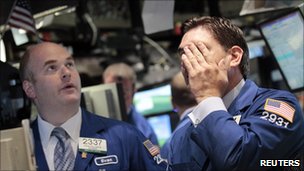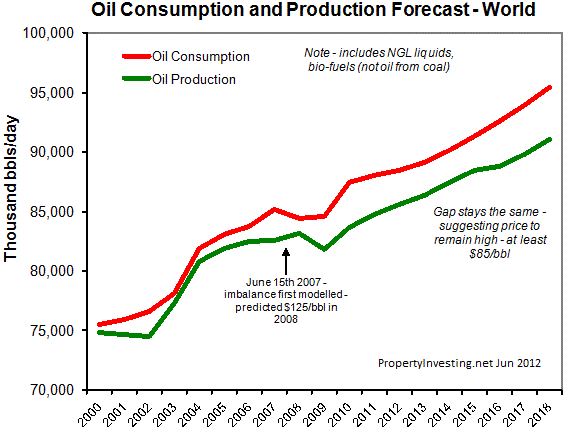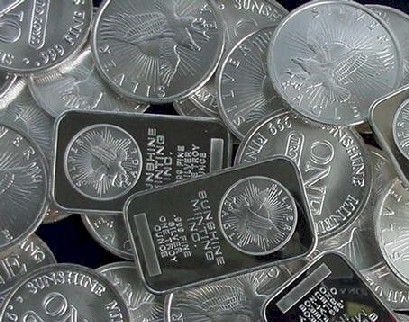431: The End Game is getting closer - the panic has not even started
06-14-2012

PropertyInvesting.net team
End Game: The end game for gold and silver is starting to draw closer. The continued Eurozone crisis is a mere precursor to the larger US crisis and gold price’s assent to the summit.
Look-Back: Let’s roll back to 2008. Western developed nations had a financial crisis from private sector over-leverage during the boom years. This crisis was right across the USA and Europe. It was compounded by rising commodities prices as oil supply failed to meet demand in the lead up to the Beijing Olympics. All of a sudden, the investor mood changed and everyone expected a recession – of course it happened.
Mistaken Government Bailed Out Of Private Sector: The big mistake was the governments of these nations all stepping in and bailing out the private sector banks, transferring the private debt to the weak sovereign balance sheets. Public sector debts then soared. Printing of money was then used for inefficient public projects that did not actually create any value – they just spent money. The money was hoarded by banks. There was a degradation in economic efficiency. Growth slowed. The austerity measures slowed growth further and spooked the markets.  Recessions have started to break out. Zero % interest rates and high inflation meant savers have been destroyed and private investment has been minimal. Much of the printed money was used by banks for speculation on commodities –further increasing inflation. An unintended consequence, though entirely predictable.
Recessions have started to break out. Zero % interest rates and high inflation meant savers have been destroyed and private investment has been minimal. Much of the printed money was used by banks for speculation on commodities –further increasing inflation. An unintended consequence, though entirely predictable.
Weak Peripheral Countries: The PIIGs countries were hit the hardest – these countries have weak manufacturing output, an aging population, early retirement, large bloated public sectors, no oil/gas/coal production, weak financial sectors and massive commodities import bills. It’s more difficult to work hard in beautiful sunny climates – compare this with the dismal winters in NW Europe where there is nothing better to do than work hard and earn lots of money – this two tier economy is nothing new. Regrettably the stereo-type of Greeks drinking Ouzo on the beach whilst the German slave away in car plants in dingy cold Hamburg has some truth to it.
Printing: The USA printed more money and inflated oil prices further – leading to unsustainably high oil import bills compared to economic output in 2011 and onwards. Debt levels rapidly deteriorated and as the countries fell back into recession, the market’s view of the risk of lending more money these governments changed for the worse, driving rates in Greece, Spain and Italy to record highs.
Forecast: So what next. Well, so far our predictions have been very accurate – so you should listen carefully here. If you do, you can make some serious money and protect your wealth and assets for you and your family.
PIIGS: Firstly, there will be no let up for the PIIGs countries – rates will continue to rise, the ECB and Germany will keep trying to keep the show on the road, but eventually there will have to be at least Greece, if not Spain, Italy, Portugal and Ireland leave the Euro. Haircut all around. The markets will run against these countries and panic will spread. Germany and France will not be able to afford to bail these countries out. Property prices in Spain, Greece, Portugal, Italy and Ireland will crash – or crash further. At the end of the crisis these should be at least half their original price in Spain and Greece – due to high unemployment levels, oversupply and the weak economy plus the threat of trading the strong Euro in for a weak local currency of half the value. If you bought a Euro 250,000 apartment in Spain in 2007, it might be worth Euro 125,000 at the end of the crisis and as little as Euro 67,500 in local currency terms if Spain left the Euro – so please watch out, do not buy Mediterranean property at this time. Italy might survive the worst because its economy is more balanced and Monti – an unelected technocrat – is trying to balance the budget – markets might give him a chance whereas time ran out for Spain. Many years of overspending and inflating a property bubble by the previous socialist government have meant debts are now far too high for the new centre-right government to work the austerity measures effectively without creating a huge recession.
France: As for France, it is on the cusp big problems. We predict its new socialist government will slowly descend into economic crisis as the markets desert France. Some of the early ministerial decisions bear all the hallmarks of a far left anti-business government try to make their mark and they are no longer aligned with the Germans. They will become more insular and taxes will skyrocket. Wealthy French will shift their money out of France as soon as they can – before they get caught by the French tax man. There is no longer a strong Franco-German financial axis to Europe. Careful with France – it could go pear shaped like Spain. Don’t buy French property either.
USA Elephant In The Room: Eventually though, the elephant in the room that everyone quietly forgets about is the USA. Its finances are in a similar shape to Spain – in terms of deficit per person, % deficit and borrowing requirements, and  issued in the aftermath of a property bubble. Both their oil import bills as a % of GDP is similar. Granted, the US has more resources, stronger manufacturing and is the global reserve currency, but they actually have a large public sector than the Spanish and gigantic unfunded liabilities. Medical costs in the USA run to a gigantic $7000/person – that’s $28,000 a year for a family of four and their medical performance is 37th in the world – grossly inefficient with drugs companies making giant profits from government subsidies and inefficiencies. Totally unsustainable. In surveys, Cuba provides similar medical care for $400/person per year.
issued in the aftermath of a property bubble. Both their oil import bills as a % of GDP is similar. Granted, the US has more resources, stronger manufacturing and is the global reserve currency, but they actually have a large public sector than the Spanish and gigantic unfunded liabilities. Medical costs in the USA run to a gigantic $7000/person – that’s $28,000 a year for a family of four and their medical performance is 37th in the world – grossly inefficient with drugs companies making giant profits from government subsidies and inefficiencies. Totally unsustainable. In surveys, Cuba provides similar medical care for $400/person per year.
Recession Starting: We think that when all the Eurozone sovereign governments have to restructure their debts and some leave the Euro, a western recession will start end 2012. Just as President Obama is re-elected in November 2012 – the focus will then shift to the appalling US debt problems. Markets will start to take flight from the US dollar – along with the Euro. China’s currency is not open for business, Japan has its own troubles and no other significant large currencies plays exist. There will then be a panic – and the only thing remaining for true safe haven status will be gold (and silver). People will be paying Swiss banks to keep their currencies in Swiss Francs – negative rates. Remember it's 5 years since the last recession started - some countries barely moved out of recession - we are now entering a cyclical further recessionary period. This is normal in western developed nations when oil prices remain high - similar to the period 1970 to 1992.
Transfer From Dollar To Gold In Panic: Even if only 10% of US dollars shifted into gold, the gold price would triple from $1600/ounce to $4800/ounce. Just a bit of panic would see gold sky-rocket. Panic has not yet started – because financial  markets, governments and super rich individuals have merely shifted money from Greece, Spain and Ireland etc to the USA. But when confidence is destroyed in the USA because of a recession end 2012. The dollar will decline and then gold will rise as the dollar crashes – then the Fed will print more money, then the dollar will decline further then gold will rise further – this will amplify the gold price.
markets, governments and super rich individuals have merely shifted money from Greece, Spain and Ireland etc to the USA. But when confidence is destroyed in the USA because of a recession end 2012. The dollar will decline and then gold will rise as the dollar crashes – then the Fed will print more money, then the dollar will decline further then gold will rise further – this will amplify the gold price.
Contagion: So just watch this unfold. Contagion from Greece, Spain, Italy, France over the summer – a recession by end 2012 firstly in Europe then spreading to the USA – stock markets drop but will be boost back as the Fed starts printing money later in 2012, only for the market to start a run on the US dollar by early 2013 – at which time gold will start to skyrocket.
Oil Price Uncertain: It’s difficult to predict whether oil will rise or not – as the recession hits, oil prices will drop, but as the Fed prints more money, oil prices will rise. Then there is Iran –a wildcard - and a potential war in the Middle East. OPEC may also decide to either increase or decrease supplies - or some big producers might have production problems or new supplies coming on-stream. Demand destruction is taking place being offset by robust Chinese and developing nation's demand growth. QE3 will drive oil prices higher and stock prices higher. No QE3 will send prices of oil and stocks lower. All these factors are very uncertain – hence it’s not safe to say anymore oil stocks will rise during this period. They will be very turbulent – possibly range bound?

Expanding Oil Consumption and Production - Still Tight: Liable to disruption. Enclosed above is our very latest model update using all countries oil consumption and production up to 2011 with forecast to 2018. Is also has modelled within it the expanding bio-fuels oil production. As one can see, there is a pinch point around 2008 when oil price sky-rocketted to $148/bbl briefly, then a further pinch-point in 2011 - this situation is become more stable with gap reducing. However, there is still high consumption than production and hence prices will remain fairly high - in our opinion, above $85/bbl. The  situation is still fairly tight even though production continues to expanded. If any country with say 1 million bbls/day was to go off-line, then oil prices would rise sharply. In the current fairly stable state, we expect prices to remain above $85/bbl - unless a severe global recession hits - this is of course fairly likely in 2013. New technological advances in fraccing -horizontal wells (oil shale), deepwater technology and new countries coming on-stream have meant we now expect oil production to rise high - though consumption continues to out-strip supply. In any case, do not expect oil prices to drop a lot because as the US deficit stays at 10%, the Fed will need to print 10% more money each year and hence this money will work its way through quickly to oil prices - since more dollars just means reducing buying power. Middle East countries will want to see prices rise 10% a year to make up for the declining dollar value of 10% per year. This is just logic. So in real terms - oil prices may stay flat, but in nominal terms - when the amount of dollar printing is taken into consideration, oil prices will rise by 10% a year. Hence oil is a good hedge against inflation. That is why oil stocks should also rise by 10% a year - just to account for the increased printed money because of the US deficit. We hope this makes sense. Just logic and we are confident we are right on this!
situation is still fairly tight even though production continues to expanded. If any country with say 1 million bbls/day was to go off-line, then oil prices would rise sharply. In the current fairly stable state, we expect prices to remain above $85/bbl - unless a severe global recession hits - this is of course fairly likely in 2013. New technological advances in fraccing -horizontal wells (oil shale), deepwater technology and new countries coming on-stream have meant we now expect oil production to rise high - though consumption continues to out-strip supply. In any case, do not expect oil prices to drop a lot because as the US deficit stays at 10%, the Fed will need to print 10% more money each year and hence this money will work its way through quickly to oil prices - since more dollars just means reducing buying power. Middle East countries will want to see prices rise 10% a year to make up for the declining dollar value of 10% per year. This is just logic. So in real terms - oil prices may stay flat, but in nominal terms - when the amount of dollar printing is taken into consideration, oil prices will rise by 10% a year. Hence oil is a good hedge against inflation. That is why oil stocks should also rise by 10% a year - just to account for the increased printed money because of the US deficit. We hope this makes sense. Just logic and we are confident we are right on this!
Miners: Gold and silver miners are extremely low in price – way undervalued. In the long term, these are an excellent investment. But in the short-medium term if there is another recession and short intense deflationary period, then the mining stocks could also be beaten down even further. Financial markets view all but the largest mining companies as high risk. But eventually they should rise far higher than they are now. Again, rather uncertain and very erratic.
Safe Haven: It’s really looking like the only safe place at the moment to invest is physical gold and silver. If currencies get hammered by a recession, gold is the investment of choice. If governments then start printing money like crazy, then gold is the investment of choice – and silver can go skyrocketing along with gold.
Silver Still The Deal Of The Century: We think silver is the deal of the century and gold is the rather safer option. Both are destined to rise far higher as a true store of value in panic stricken times. We suggest hold them in equal value terms for maximum benefit – safety versus upside.
Too Much Big Government: The present troubles frankly are just the beginning and it will be many years before we reach the bottom. As we described, the big mistake was governments stepping in – nationalising banks and trying to control the markets. Eventually this always fails – but it takes a lot more time to play out. Private transferred to sovereign debt – it was always going to lead to a contagious sovereign debt crisis – with its logical end point in the USA.
Cannot Afford Big Government: Governments are far too big, costly, interfering, produce too much regulation that slows innovation, value creation and entrepreneurial investment. They increase taxes to pay for themselves and hinder private enterprise in the process – the only real revenue generators for governments. In bailing banks out,  governments are implicitly saying they are more capable of running banks than the private sector. Layers of regulation did not and will not help. A classic example is - moral hazard – the ECB lent a paltry Euro 100 billion to Spain to recapitalize its banks, then the next day S&P came along and massively downgraded Spain by three notches to one level above junk – because they had accepted the loan! This has now precipitated the crisis and rates have now jumped to 7%. Classic Euro government interference that made matters worse.
governments are implicitly saying they are more capable of running banks than the private sector. Layers of regulation did not and will not help. A classic example is - moral hazard – the ECB lent a paltry Euro 100 billion to Spain to recapitalize its banks, then the next day S&P came along and massively downgraded Spain by three notches to one level above junk – because they had accepted the loan! This has now precipitated the crisis and rates have now jumped to 7%. Classic Euro government interference that made matters worse.
Gigantic Public Sectors: These government employees are generally intelligent and hard working like everyone else. What happens when one creates a public sector role. Firstly, the more you spend, then more people you employ, the more bonus you get, the higher your salary grade and the higher you wages and pension. This acts the opposite direction to the private sector where the onus is on efficiency, cost cutting and profits - lean and mean. A public sector administrative worker will make work to justify their position - they are generally paid to create regulations and red tape. They are paid to distrust and put pressure on the private sector - they start to control, govern and guide and step in - interfere and slow things down. The size of the public sector is now gigantic - in 1915 in the USA it was about 15% of workers - it is now 50% - over three times bigger. What value do they add - this is without a public sector healthcare as well. No wander the deficits are so large - its only logical.
US Could Tip Quickly: If it takes a week for Spain to turn from reasonably stable to one notch above junk, after asking for a loan – leading to interest rates skyrocketing to record highs of 7%, then we fear for the USA when a recession hits. No amount of helicopter Ben’s printed money will stem the run on the dollar and hike in interest rates. Once this starts, it’s a vicious circle. It can happen very quickly. And there is absolutely no-one that can bail the USA out. If the USA is in a recession, China will be slowing dramatically and they will have their own problems, as will Germany. It’s looking very bleak and will get far worse, please be warned. If the US dollar crashes, the only remaining safe haven will be gold – just like in early 1980.
Probably the safest investment at this time is to short the Spanish and Greek property markets – for the next few years. And buy physical gold and silver.
And please be aware, the panic has not even started yet.

